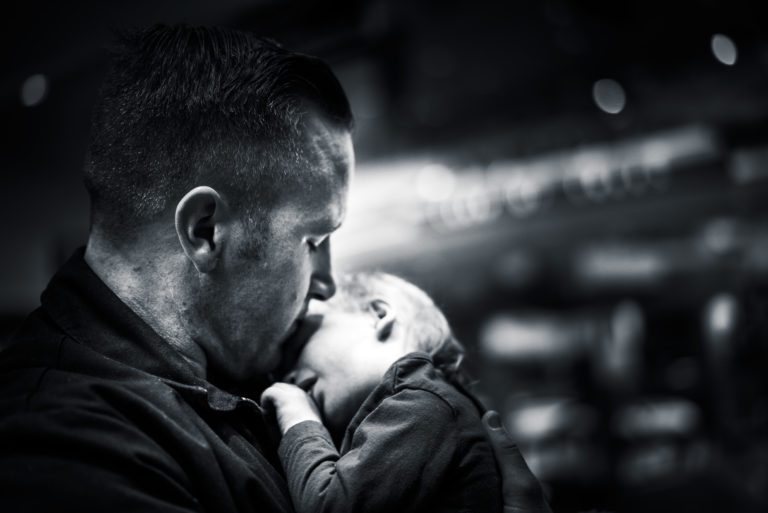
Master Sgt. Ernie Valley cradles his new daughter, Oleksandra, after greeting her at the Boise Airport, Boise, Idaho, Jan. 23, 2014. Image by Tech. Sgt. Samuel Morse.
Inheriting and Inventing Fatherhood
We brought my first son home from the hospital on Christmas Day. After the flood of family and friends departed, we were finally left alone with our tiny infant. I remember thinking to myself “OK, now what!?”
As a professional coach who works with fathers, I once conducted a survey where I asked, “What training did you receive to be a father?”
One man shot back, “You’re kidding, right?” I wasn’t kidding. The sad truth is that you get more training to drive a car than to have a child.
The kind of father you become can be heavily influenced by notions you don’t even know you have the day your child is born. For better or worse, it’s impossible to enter life as a parent unaffected by the framework and culture of your upbringing. It’s your starting point.
I was exposed as a young boy to many different models of fatherhood from various sources on TV, at the movies, in my family, and around the neighborhood: the quiet, aloof dad who comes home from work and is left alone to sit in his chair (hey, he worked hard all day) while Mom cooks dinner; the docile dad who leaves all the big decisions to his wife, “the boss”; the all-powerful patriarch who rules the roost without opposition; the Great Santini-style marine sergeant who is always ready to knock some sense into his young charge.
I also grew up in a time where fathers were expected to be breadwinners, not nurturers. So I figured I was in charge of making the money for the family, taking care of discipline and academics.
It’s not as if my wife and I discussed any of this. They were just assumptions I made without realizing it. I think it’s safe to say I inherited these roles from my own father, like an automatic download.
But I knew I wanted more. Most Dads do.
I wanted always to be able to talk to my children, to maintain an active and open channel of communication. I wanted them to know I could see what they were doing and who they were becoming. I wanted them to know that, in good or difficult times, we would always be able to talk.
I also wanted my children to know and feel, without any doubt, that I loved them unconditionally — that no matter who they became, what they did, where they went… that I just loved them. I wanted this love to give them the freedom to be whoever they wanted to be.
Though I am far from perfect, I have worked at being present in this way to my two sons. This has been the greatest joy of my life.
I don’t mean to suggest that everything has gone just swimmingly. Hardly. My wife and I have experienced many of the great moments that parents dream about, but also some of the moments you pray will never happen.
So here’s my bottom line about being a father. It’s easy when the report card is aces, when health is good, when the kitchen is full of laughter. But your finest hour doesn’t come until the going gets tough. And it inevitably does.
It is in the most challenging circumstances that you get to see what kind of father you really are. If you haven’t taken the time to consider this, you may too easily default to some automatic setting. That’s probably not who you really want to be for your children, nor who they need you to be.
Recently, for completely different reasons, I chose to have a difficult and uncomfortable conversation with each of my two sons. Both times I was nervous. Both times I was able to be vulnerable, as they say. I’m not ashamed to say there were tears. Both conversations ended with an embrace.
It’s been 21 years since the doctor gently placed that tiny boy in my hands and here’s what I’ve learned: in the end, the key to being a father is to see your children — to see them so clearly that they can feel it. This is how your children will know that you are standing with them, not just one part of who they are but all of who they are.
And when in doubt, go with your heart, not your head.

Share your reflection